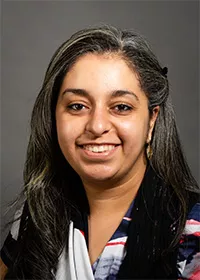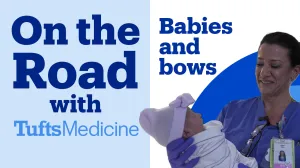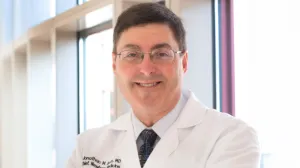
When the Mother Infant Research Institute (MIRI) was founded in 2011, it was the only multidisciplinary research institute in the United States combining Pediatrics and Obstetrics. That scientific work has continued and grown, but it now will have the benefit of clinical and translational study management expertise spanning all Tufts Medical Center trials in the MIRI, OB/Gyn and the NICU.
Taysir Mahmoud holds the newly created position of Supervisor of Clinical and Translational Research in MIRI, OB/Gyn and Pediatrics to accomplish that task.
Taysir joined the MIRI over three years ago as a Clinical Research Coordinator III. She has over 10 years' experience in research, working in various roles. Prior to joining Tufts, she worked as a data manager at Brigham and Women's Hospital, where she was responsible for the tracking, maintenance and validation of data collected from over 1500 patients longitudinally in the BRASS study, a rheumatoid arthritis registry. In addition to her extensive work with SAS programs, REDCap and Microsoft Access databases, she interviewed and trained new hires and worked with programmers to define parameters needed for data validity and cleaning. Her time as a data manager taught her to consider the study from every perspective and enabled her to communicate effectively with various study staff with different levels of expertise. Since joining the MIRI in 2019, Taysir has been responsible for screening and recruiting participants from obstetrics clinics for multiple studies. In this role, Taysir often conducts study visits, collects samples and coordinates communications with study and clinical staff in the Clinical and Translational Research Center (CTRC), Obstetrics clinics, Labor & Delivery and NICU. She has excellent experience with creating SOPs, submitting and managing IRB protocols and works closely with the study team to complete wet lab work (e.g. processing biospecimens, including placenta). She has also trained coordinators and researchers on a range of tasks including neonatal body composition measures, new study set-up steps, recruitment strategies and IRB submissions. Her experience in clinical and translational research as well as her interpersonal communication skills will be a huge asset to our efforts to increase synergy and grow research across MIRI, Obstetrics and Gynecology and NICU.
These changes to infrastructure and organization will improve study team communication and take advantage of the diverse, multi-disciplinary expertise manifest in our research staff, resulting in successful sustainable growth of MIRI, OB/GYN and NICU research. These changes will also strengthen our position us as a group when applying for Center grants, as communication improves and we collaborate more efficiently.
Taysir's expectations in her new role involve first of all familiarizing herself with ongoing research studies in the three departments. "My personal goal is to learn as much as I can about what trials are going on here, and to better understand what procedures and components they involve for everybody that's working on them. Step two would be to see what I can contribute, as a resource, to help facilitate these things, to make sure that we're working as efficiently and collaboratively as possible. I really want to help everyone get the most productivity out of each project, by achieving what MIRI Executive Director Perrie O'Tierney-Ginn terms 'frictionless research.'"
"I'm aiming to have an eagle eye perspective on the studies," Taysir says, "seeing the three departments as a whole and running air traffic control, landing the right planes on the right runways, to match the needs of everybody."
This re-organization will counteract the "silo" tendency in research projects with a team approach that operates cooperatively in the following ways:
- cross coverage on equipment, lab procedures and/or study administration
- support for coordinators whose workload is currently heavy
- cross-training and relationship-building so that all skills are shared
- pooling supplies used by study teams used in several studies, to stretch these resources further within their expiration dates
- improving lines of communication between coordinators and their PIs by troubleshooting any issues that do not need to rise to the level of a PI/coordinator
Taysir's coordinators are creating relationships that truly facilitate their work. For example, a MIRI coordinator with no prior REDCap experience was trained by Taysir initially on how to set up a REDCap database and how to think about her data entry and validation. This coordinator has now done extensive work with multiple REDCap databases and her experience has surpassed what Taysir had taught her. When a different coordinator from Pediatrics asked for assistance with REDCap, Taysir now had an expert on the team who could help. These two coordinators in turn were able to mutually help each other with research tools like REDCap and DocuSign, making for an increased skill set all around.
Taysir's new role presents her with many new interesting opportunities and challenges. The first is teaching."When I teach new coordinators things, I don't necessarily teach them how to do something, I try to teach them how to think about doing it." An example of this is how to respond to IRB comments on a protocol. Taysir will advise on the general approach for the answer applicable to that study, and others, rather than dictate a verbatim response. Giving individuals independence as you instruct them is something that Taysir owes to her education at Wellesley, where she received a BA. "I didn't just learn things at Wellesley, I learned how to learn things at Wellesley." This valuable aspect of a liberal arts education, she feels – "giving people the tools for how to teach themselves – how to think about a problem, the self-educational aspect" ultimately applies to research and to any work situation.
"There are a total of ten coordinators in my new team. Each one of these coordinators brings a different set of experiences and a unique and invaluable perspective. They bring their own years of experience in their own studies and training. I want to supplement that. I want to foster that and enhance it. That's a challenging line to walk, working at this for as long as I have," Taysir says. There are definitely ways that she can draw on her own experience and thinking as a coordinator, but "I always have to dial back on that and ask questions" to help the individual tease out the best approach to an issue, like: What do you need? What are you trying to accomplish here? What is the aim of this specific project? Once I understand the goal, I can help fine tune the approach."
Once the question is posed clearly, a coordinator can strategize to get the best answer to it, not unlike defining the best hypothesis to a research study in order to design the study most effectively. "That's the big challenge – we have ten talented, dedicated people who have been hired by different PIs for different facets of their individual studies. This is an opportunity for me to learn all kinds of different things. I can add knowledge to areas where I have experience and learn new things I'm not experienced in. I can take new approaches to different problems and enable us to work all together as one big unit of research that is integrated across three different departments."


